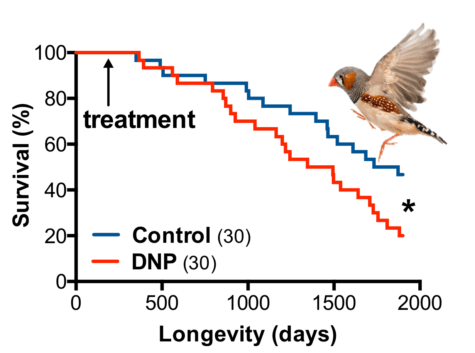TURKU, Finland — DNP (2,4-dinitrophenol) emerged in the early 1930s as a promising weight loss drug. By 1938, however, the drug stopped being sold due to its toxic and fatal side effects. Unfortunately, over the past decade or so DNP has made a bit of a comeback on illegal online marketplaces. Now, a new study using birds has collected compelling evidence that regular DNP use can cut the human lifespan by roughly 20 percent. That’s the equivalent of about 15 years!
DNP, technically a molecule, works by decreasing how efficiently food is converted to cellular energy. While that does seem to help when it comes to losing excess weight, DNP clearly carries some troubling adverse effects as well. There are simply tons of better and healthier ways to lose weight.
Despite scientists and health professionals knowing that DNP is bad news for humans, researchers have been conducting tests using animals and DNP. For example, a 2008 study concluded that DNP may actually extend the lifespan of lab mice.
That finding, of course, is quite different than DNP’s effect on humans. In pursuit of an explanation, Dr. Antoine Stier, a Collegium Researcher at the University of Turku in Finland, theorized that the weight loss provided by DNP was masking its toxic side effects on both humans and animals.
DNP has a devastating impact on birds
Dr. Stier set up a new experiment involving captive zebra finches. Those birds received DNP treatments for a few years and researchers recorded cellular aging and lifespan indicators.

“The birds, which are a widely used avian model not displaying age-related obesity, were treated with a dose of DNP per kilo which was well within the range of what is used illegally by humans. The dose had no short-term deleterious effects and only mildly increased the metabolism of these birds,” says CNRS researcher Dr. François Criscuolo in a university release.
“While DNP-treated birds were looking healthy, demonstrated similar physical performances than control animals, and were not displaying physiological signs of premature aging, this new study reveals that the lifespan of the birds was actually reduced by 20% (~ 1 year). This would be equivalent to a reduction of approximately 15 years in human life, which should provide a serious warning signal to both current and prospective users, as well as to scientists investigating its use as a medicine,” Dr. Stier adds.
In short, don’t use DNP. No new waist size, no matter how small, is worth a shorter life.
The study is published in Comparative Biochemistry and Physiology Part C: Toxicology & Pharmacology.
